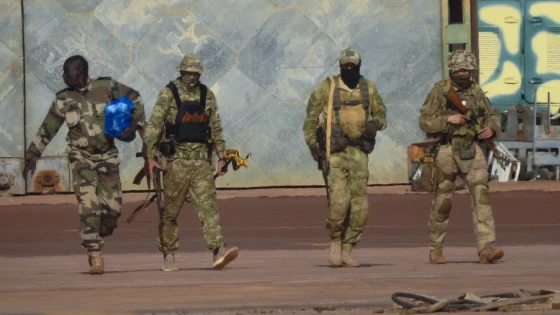In a startling turn of events, Niger, a longstanding ally of the United States in Africa, recently made the decision to expel US military forces from its territory following a coup. What prompted this sudden shift in allegiance? According to Gen. Michael Langley, the head of US Africa Command (AFRICOM), Russian disinformation campaigns played a pivotal role in swaying Niger‘s decision.
Addressing the House Armed Services Committee, Gen. Langley highlighted Russia’s sophisticated playbook of disinformation, which he likened to a passing game designed to manipulate perceptions and sow discord. This disinformation campaign, he asserted, was instrumental in shaping Niger’s stance towards US military presence within its borders.
One striking example of Russia’s aggressive disinformation tactics occurred last April, when Russian mercenaries from the Wagner Group strategically buried bodies near a French military base recently occupied by French forces. Subsequently, they launched a social media campaign blaming the French forces for the incident. This manipulation of information underscores the savvy and agility of Russian disinformation actors in exploiting regional tensions to advance their agenda.
In response to the growing threat of disinformation, Gen. Langley emphasized the need for bolstering counter-disinformation efforts, both within the US military and in collaboration with diplomatic channels. He called for enhanced capabilities in the State Department’s Global Engagement Center (GEC) and emphasized the importance of robust information operations within the military.
However, the current budgetary constraints facing the GEC raise concerns about its ability to effectively combat disinformation. With a modest budget of $61 million, the GEC pales in comparison to Russia’s annual expenditure of over $1.5 billion on global information campaigns. Moreover, the looming prospect of the GEC’s closure due to congressional inaction underscores the urgent need for sustained support and funding to counter disinformation effectively.
In addition to diplomatic and military efforts, the US Army’s special operations forces possess a formidable information warfare capability. Yet, this vital component of the US military’s arsenal also faces the threat of potential cuts, further complicating efforts to confront the growing influence of disinformation.
As geopolitical rivalries intensify and adversaries exploit information as a weapon of influence, the United States finds itself engaged in a multifaceted battle for strategic influence. The outcome of this struggle will not only shape alliances and partnerships but also determine the future trajectory of global security and stability. In the face of evolving threats, vigilance, cooperation, and investment in counter-disinformation capabilities remain imperative to safeguarding democratic values and interests on the world stage.

















